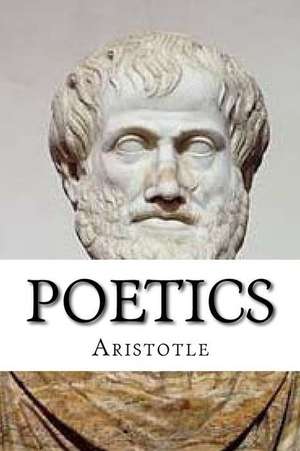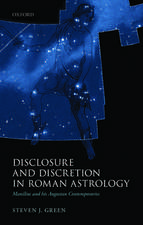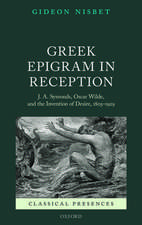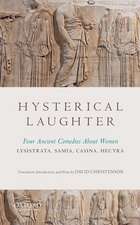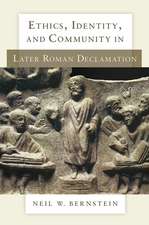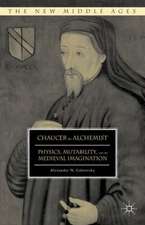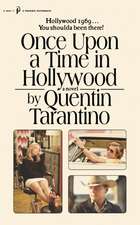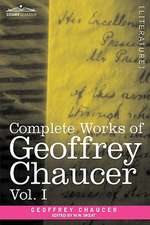Poetics
Autor Aristotleen Limba Engleză Paperback
| Toate formatele și edițiile | Preț | Express |
|---|---|---|
| Paperback (11) | 34.82 lei 22-36 zile | |
| – | 34.82 lei 22-36 zile | |
| CREATESPACE – | 38.43 lei 22-36 zile | |
| CREATESPACE – | 45.82 lei 22-36 zile | |
| Penguin Books – 25 sep 1996 | 51.36 lei 25-31 zile | +16.06 lei 5-11 zile |
| CREATESPACE – | 62.50 lei 22-36 zile | |
| Prometheus Books – 31 oct 1992 | 66.05 lei 22-36 zile | |
| Hackett Publishing Company – aug 2006 | 91.22 lei 22-36 zile | +13.20 lei 5-11 zile |
| Hackett Publishing Company – 15 dec 1987 | 121.68 lei 22-36 zile | +24.33 lei 5-11 zile |
| CreateSpace Independent Publishing Platform – 8 dec 2015 | 58.11 lei 43-57 zile | |
| COSIMO CLASSICS – 30 oct 2008 | 74.27 lei 43-57 zile | |
| Book Jungle – 3 iul 2008 | 75.17 lei 43-57 zile | |
| Hardback (1) | 328.85 lei 22-36 zile | |
| Hackett Publishing Company – 15 dec 1987 | 328.85 lei 22-36 zile |
Preț: 34.82 lei
Nou
Puncte Express: 52
Preț estimativ în valută:
6.66€ • 7.24$ • 5.60£
6.66€ • 7.24$ • 5.60£
Carte disponibilă
Livrare economică 31 martie-14 aprilie
Preluare comenzi: 021 569.72.76
Specificații
ISBN-13: 9781539191575
ISBN-10: 1539191575
Pagini: 38
Dimensiuni: 152 x 229 x 2 mm
Greutate: 0.06 kg
ISBN-10: 1539191575
Pagini: 38
Dimensiuni: 152 x 229 x 2 mm
Greutate: 0.06 kg
Notă biografică
Aristotle (384-322 BC) was a Greek philosopher during the Classical period in Ancient Greece, the founder of the Lyceum and the Peripatetic school of philosophy and Aristotelian tradition. Along with his teacher Plato, he has been called the Father of Western Philosophy. His writings cover many subjects - including physics, biology, zoology, metaphysics, logic, ethics, aesthetics, poetry, theatre, music, rhetoric, psychology, linguistics, economics, politics and government.
Aristotle provided a complex synthesis of the various philosophies existing prior to him, and it was above all from his teachings that the West inherited its intellectual lexicon, as well as problems and methods of inquiry. As a result, his philosophy has exerted a unique influence on almost every form of knowledge in the West and it continues to be a subject of contemporary philosophical discussion.
Little is known about his life. Aristotle was born in the city of Stagira in Northern Greece. His father, Nicomachus, died when Aristotle was a child, and he was brought up by a guardian. At seventeen or eighteen years of age, he joined Plato's Academy in Athens and remained there until the age of thirty-seven (c. 347 BC). Shortly after Plato died, Aristotle left Athens and, at the request of Philip II of Macedon, tutored Alexander the Great beginning in 343 BC. He established a library in the Lyceum which helped him to produce many of his hundreds of books on papyrus scrolls. Though Aristotle wrote many elegant treatises and dialogues for publication, only around a third of his original output has survived, none of it intended for publication.
Cuprins
Translated with an Introduction and Notes by Malcolm Heath
Introduction
1. Human culture, poetry and the Poetics
2. Imitation
3. Aristotle's history of poetry
4. The analysis of tragedy
5. Plot: the basics
6. Reversal and recognition
7. The best kinds of tragic plot
8. The pleasures of tragedy
9. The other parts of tragedy
10. Tragedy: miscellaneous aspects
11. Epic
12. Comedy
13. Further reading
14. Reference conventions
Notes to the Introduction
Synopsis of the Poetics
POETICS
Notes to the translation
Textul de pe ultima copertă
Aristotle's Poetics is one of the most powerful, perceptive and influential works of criticism in Western literary history. A penetrating, near-contemporary account of Greek tragedy, it demonstrates how the elements of plot, character and spectacle combine to produce 'pity and fear' - and why we derive pleasure from this apparently painful process. It introduces the crucial concepts of mimesis ('imitation'), hamartia ('error') and katharsis, which have informed serious thinking about drama ever since. It examines the mythological heroes, idealized yet true to life, whom Aeschylus, Sophocles and Euripides brought on to the stage. And it explains how the most effective plays rely on complication and resolution, recognitions and reversals. Essential reading for all students of Greek literature and of the many Renaissance and post-Renaissance writers who consciously adopted Aristotle as a model, the Poetics is equally stimulating for anyone interested in theatre today.
Recenzii
"I find the Introduction extremely convincing, lucid, learned, fair to past scholarship, and truly illuminating about the meaning of tragedy in general and about the very specific acceptions of hamartia, katharsis, ekplxis, and thauma, in the context of an appropriate understanding of the Poetics. Another remarkable feature is the dexterity and ease with which it draws on all the relevant parts of the Aristotelian corpus to shed light on troublesome textual passages in the Poetics. Finally, the style of the Introduction is straightforward, free of unnecessary jargon, direct, and economical, the best interpretation of the Poetics I ever read." -- Sabetai Unguru, Tel Aviv University
"The translations of Joe Sachs are a great gift to Greekless amateurs like me. He uses simple, unambiguous words joined into sentences that are often complex, as they must be to be accurate, but always clear (after sufficient attention has been paid). A stylist may find some awkwardness in the hyphenated compound words and the noun clauses he prefers to the polysyllabic Latinate words often found in English versions of Aristotle. But these blunt locutions along with Sachs' excellent notes manage to convey both the richness of meaning and the clarity of thought of their Greek antecedents. The resulting translation may strike some as awkward in style, but it will strike the careful reader who cares about what is translated as elegant (in the way mathematicians use that word)." -- Jerry L Thompson, Author, "Truth & Photography"
"The translations of Joe Sachs are a great gift to Greekless amateurs like me. He uses simple, unambiguous words joined into sentences that are often complex, as they must be to be accurate, but always clear (after sufficient attention has been paid). A stylist may find some awkwardness in the hyphenated compound words and the noun clauses he prefers to the polysyllabic Latinate words often found in English versions of Aristotle. But these blunt locutions along with Sachs' excellent notes manage to convey both the richness of meaning and the clarity of thought of their Greek antecedents. The resulting translation may strike some as awkward in style, but it will strike the careful reader who cares about what is translated as elegant (in the way mathematicians use that word)." -- Jerry L Thompson, Author, "Truth & Photography"
